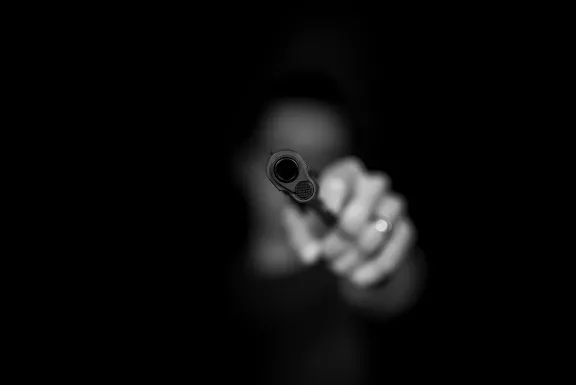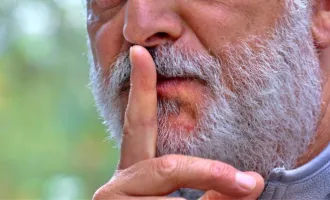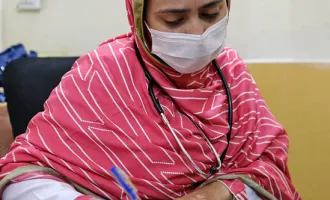
Photo by Max Kleinen on Unsplash
This Date in UCSF History: Memorial Campaign to End Gun Violence
On August 26, 1999 Robert Sadler, a UCSF postdoctoral fellow in the Department of Microbiology and Immunology, was shot and killed in a drive-by shooting in the outer Sunset.
Sparked by Sadler’s death and fueled by the many gun deaths since, Sadler’s friends and colleagues have formed a chapter of the Bell Campaign, a national group founded at San Francisco General Hospital that treats gun violence as a public health problem.
Sadler, 36, was enjoying a drink with friends at the Club Sirocco on Judah and 29th Avenue last August when he was shot and killed, an innocent bystander.
According to newspaper accounts and police sources, the alleged shooters had been involved in an altercation earlier in the evening and had been ejected from the bar, vowing to return and make trouble.
Later that night, the assailants opened fire from the sidewalk through the closed tavern doors, fatally injuring Sadler and wounding another man in the arm.
He was described by colleagues as passionately committed to his work on the viral basis of Kaposi’s sarcoma, a leading tumor of AIDS patients.
Working in the lab of UCSF virologist Don Ganem, he had recently found that the products of the human herpes virus B (HHVB) Kaposin locus, a gene originally discovered in Ganem’s lab, were much more complicated than previously appreciated.
“Rob unearthed a complex and beautiful translational program in the Kaposin gene — work that took us all by surprise and changed the way we thought about the locus,” said Ganem recently. “It was really a thing of beauty.”
In addition to his enormous promise as a scientist, Sadler was remembered by family and friends at his memorial service as a warm and genial person, quick with a smile and the frequent originator of practical jokes.
He was also a natural athlete — skier, rock climber and all-around outdoor adventurer, someone to whom even the most complex sports came easily. Colleagues and family members are united in the belief that the most fitting memorial to Dr. Sadler is a lasting commitment to handgun control.
Sadler graduated from Buckner College in Pennsylvania in 19K4 then worked in the Bay Area as a research technician lor several years, initially at the San Francisco VA Medical Center and later al the Palo Alto Medical Research Foundation, where his interest in microbiology was sparked by bis studies on trypanosomal parasites.
He then entered graduate school at the University of North Carolina, where he was introduced to molecular virology, the field that he ultimately planned to make his life’s work.
After completing bis graduate studies on Epstein-Barr virus in the laboratory of Dr. Nancy Raab-Traub, he came lo UCSF in 1996 as a postdoctoral fellow of the Howard Hughes Medical Institute.
A memorial notice describing Sadler’s tragic death posted in the lobby of the Medical Sciences building was soon bedecked with floral bouquets left by moved well-wishers, many of whom were anonymous.
“Everybody who knew Rob was touched by the outpouring of sympathy from the campus community,” said a friend.
Colleagues and family members are united in the belief that the most fitting memorial to Sadler is a lasting commitment to handgun control.
At a recent campus meeting they asked that members of the community wishing to pay respects to Sadler do so by contributing money or time to the Bell Campaign, a group headquartered at the San Francisco General Hospital and dedicated to the prevention of gun trauma.
Said one speaker: “We can think of no better way to honor Rob’s memory than to work to end the scourge of gun violence that took him away from us so soon.”
In addition to legislative, political, and educational activity, the Bell Campaign works to provide victim support.
Founding members consider the Bell Campaign ideal for UCSF because it focuses on the societal consequences of gun violence.
The formation of the UCSF chapter was announced at the recent campus Symposium on Violence Prevention and has attracted graduate, medical and nursing students interested in preventing gun violence. The UCSF chapter of the Bell Campaign has started a listserv “BellatUCSF.”
The UCSF Bell campaign’s first effort is participation in the Million Mom March, a rally on Mother’s Day at the Mall in Washington, D.C.
The Million Mom March advocates common sense gun laws — specifically, they are urging Congress to enact laws requiring the following:
- Trigger locks on handguns
- Gun licensing and registration
- Mandatory safety training
Many faculty at UCSF have donated frequent flyer miles to send members of the UCSF community to Washington, D.C., to join the rally. In addition, the UCSF Bell campaign chapter is organizing a trip to a rally in Sacramento.



